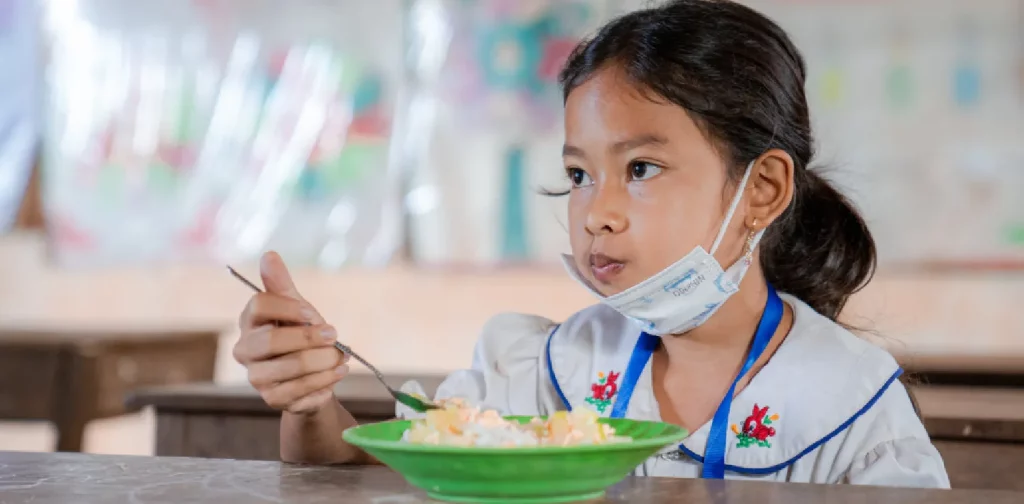How School Meals Support Children in Cambodia

A student eating breakfast before school in Cambodia. | Photo: WFP on Twitter.
For children in school, sufficient and nutritious food enables them to better concentrate and learn. Unfortunately, many still go to school with empty stomachs, including in Cambodia. The World Food Programme has been working with the government of Cambodia to provide school meals for children across the country.
Malnutrition in Cambodia
Malnutrition in children remains a challenge in Cambodia. UNICEF states that 32% of children under 5 years old are stunted, and 10% don’t have enough weight for their height. Lack of proper food, nutrition, water, and sanitation contribute to the condition.
The nutrition emergency in Cambodia is interwoven with the case of school dropouts and gender inequality. Many children have had to go to school hungry, which results in low concentration and productivity at school. Furthermore, children, especially girls, are often forced to leave school to help with the family economy or perform domestic duties.
The World Food Programme (WFP) sees that addressing these challenges requires the help of multi-sectoral school programs. The WFP has been active in Cambodia since 1979, providing assistance for emergencies through food and nutrition. One of the ways is by implementing the school meals program.
School Meals Program
The school meals program in Cambodia began in 1999. The WFP works with Cambodia’s Ministry of Education, Youth, and Sport and the National Social Protection Council in providing school meals for pre-primary and primary school children. Beyond addressing their nutrition needs, the meals also intend to incentivize parents to send their children to school.
“The meals enhance trust they have for school,” said Eam Sokhan, the principal of Doun Aov Primary School in Angkor Thom District, Siem Reap Province. “They put trust in us, and we feel very motivated.”
In 2014, the program developed by incorporating home-grown ingredients for school meals, boosting local economies, encouraging community ownership, and creating jobs.
As of 2022, the program has provided 215,300 schoolchildren in Cambodia with hot meals every morning. Furthermore, a good 70% of schools in Cambodia are sourcing their ingredients from local and smallholder farmers. The program also facilitates schools with sanitation infrastructure rehabilitation, and equips school personnel and authorities with the skills necessary to manage the program.
A Multi-sectoral Approach
The challenges faced by Cambodia in education, nutrition, and gender inequality illustrate how sustainable development issues are interrelated. The school meals program done by the WFP and the Cambodian government shows how a multi-sectoral approach is crucial in addressing the challenges while leaving no one behind.
“School meals contribute to Cambodia’s human-capital development, especially children from the poorest families. Having access to education will help them break the cycle of poverty from generation to generation,” said Narith Chan, Secretary-General of the National Social Protection Council, Cambodia.
Editor: Nazalea Kusuma

Co-create positive impact for people and the planet.
Amidst today’s increasingly complex global challenges, equipping yourself, team, and communities with interdisciplinary and cross-sectoral insights on sustainability-related issues and sustainable development is no longer optional — it is a strategic necessity to stay ahead and stay relevant.

Kresentia Madina
Madina is the Assistant Manager of Stakeholder Engagement at Green Network Asia. She holds a bachelor’s degree in English Studies from Universitas Indonesia. As part of the GNA In-House Team, she supports the organization's multi-stakeholder engagement across international organizations, governments, businesses, civil society, and grassroots communities through digital publications, events, capacity building, and research.


 Indian Gig Workers Push Back Against 10-Minute Delivery Service Strain
Indian Gig Workers Push Back Against 10-Minute Delivery Service Strain  Call for Governance: Grassroots Initiatives Look to Scale Efforts to Conserve Depleting Groundwater
Call for Governance: Grassroots Initiatives Look to Scale Efforts to Conserve Depleting Groundwater  Integrating Environment, Climate Change, and Sustainability Issues into Education Systems
Integrating Environment, Climate Change, and Sustainability Issues into Education Systems  Finally Enforced: Understanding the UN High Seas Treaty
Finally Enforced: Understanding the UN High Seas Treaty  Risks and Opportunities of Submarine Communication Cables for Sustainable Development
Risks and Opportunities of Submarine Communication Cables for Sustainable Development  Rising Attacks and Violence Against Land and Environmental Defenders
Rising Attacks and Violence Against Land and Environmental Defenders